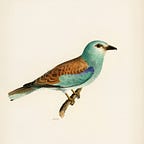A Selection of 19th-Century Slang
Because words are interesting.
Slang-whanger. Great word. Back in 1807, it was coined by the American writer Washington Irving in his satirical periodical Salmagundi to describe someone who wields words like a weapon. Not an elegant weapon, mind you — a slang-whanger does not possess a rapier wit. Rather, this person is more like a Twitter troll that won’t shut the hell up.
Every day have these slang-whangers made furious attacks on each other, and upon their respective adherents, discharging their heavy artillery consisting of large sheets, loaded with scoundrel! villain! liar! rascal! numskull! nincompoop! dunderhead! wise acre! blockhead! jackass!
As great as this word is, its existence really burned John Pickering’s biscuits. Born into a prominent New England family, Pickering traveled to England where he learned that there were a few English words that were only used in America. This troubled him enough to embark on the important task of getting the American out of American English, one word at a time.
In 1816, he published a list of what he considered to be American provincialisms in his awkwardly-titled A vocabulary; Or, Collection of words and phrases which have been supposed to be peculiar to the United States of America, and he reserved particular disdain for the term…
